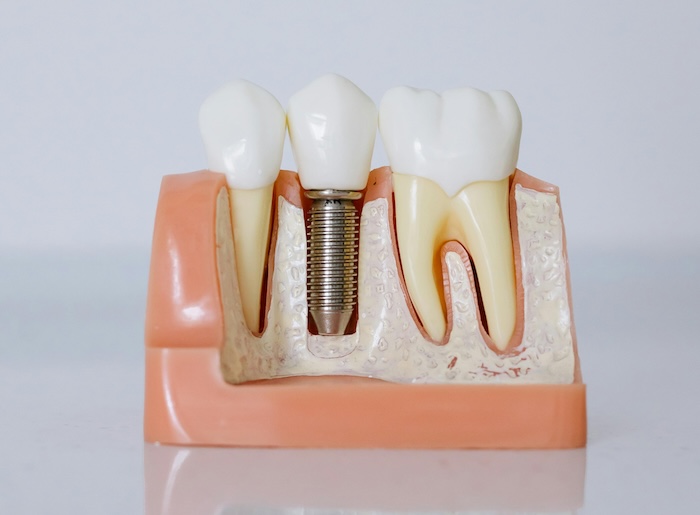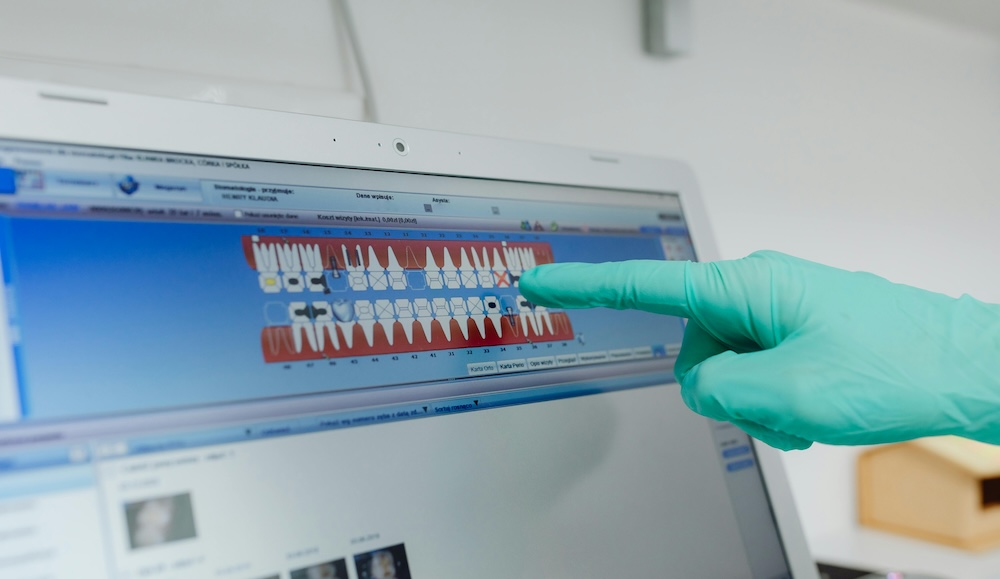What is the Difference Between an Implant and a Bridge?

If you need to replace one or more missing teeth, there are two popular options: dental implants and bridges. While both serve the same primary purpose—to restore function and aesthetics to your smile—they differ significantly in their approach, longevity, and impact on oral health. Let’s explore these differences in detail, starting with an understanding of what a dental bridge and a dental implant are.
What is a dental implant?

A dental implant is a titanium post surgically inserted into the jawbone to act as a permanent replacement root for a missing tooth. Once the bone integrates with the implant—a process known as osseointegration—it can be topped with a crown that offers the look and functionality of a natural tooth. One of the significant advantages of implants is that they do not rely on neighboring teeth for support, preserving the integrity of adjacent healthy teeth.
What is a Dental Bridge?
A dental bridge involves anchoring a prosthetic tooth (or multiple teeth) to the adjacent natural teeth, known as abutment teeth. These neighboring teeth are usually ground down to accommodate the bridge, which can in time compromise their health. While bridges can effectively restore function and aesthetics, they depend on the strength of the surrounding teeth, which can be a disadvantage in the long run.
The Key Differences Between an Implant and a Bridge
As you may have figured out, there are a few key differences between a dental implant and a dental bridge. They do both offer the ability to restore your smile and your ability to chew well, of course. Let’s review some of those key differences.
Support Structure:
- Implants: Independently supported by the jawbone, meaning healthy neighboring teeth are preserved. There is no need to alter healthy surrounding teeth.
- Bridges: Dependent on surrounding teeth for support, often requiring them to be altered or compromised. While your dental professional will do an excellent job at readying your support teeth, there is still the potential for these support teeth to break down with time. They may not be able to support your dental bridge for as long as you need them to.
Impact on Bone Health:
- Implants: Promote bone health by transferring chewing forces directly to the bone, stimulating bone growth and maintenance. If the bone in your jaw does not get that chewing force, it will begin to deteriorate.
- Bridges: Do not transfer chewing forces to the underlying bone, which can lead to bone deterioration over time. Bone deterioration and loss can ultimately lead to even more dental issues. It can also result in difficulties eating and speaking. It can also be responsible for premature wrinkling around your mouth. This may result in you looking older than you are.
Longevity:
- Implants: Known for their durability, with good oral hygiene and routine checkups, your dental implants may last as long as 20 years. Studies have shown that as many as 93% of dental implants are still in place after providing decades of functionality. They do not decay, making them a long-term solution for restoring your smile.
- Bridges: Dental bridges can last between 5 to 10 years, depending on oral hygiene and care. The teeth that dental bridges are anchored to can decay or weaken over time. This will eventually compromise the stability of your dental bridge.
Both options will still require good oral hygiene and those regular checkups with your dentist to ensure everything looks and works the way that it should be.
Which Option is the Right Option for You?
If you have one or more missing teeth, you may wonder whether an implant or a bridge is the right smile restoration solution for you. Each offers its advantages and considerations, making it important that you not only understand your options but that you work with your dentist to figure out which of those options will meet your needs.
Long-term, dental implants offer patients a better solution. That said, having a dental implant surgically implanted is not the must-have solution for all patients. There is no such thing as a one-size-fits-all solution when it comes to the health of your teeth and gums. It is important that you work with your team of dental professionals to discuss your individual situation and each of your options.
Here are a few things to consider:
- The health of your mouth, overall. If you have any other underlying oral health concerns, your dentist may need to address them with you before discussing dental implants. Gum disease, as an example, will need to be fully treated and healed before surgical placement of implants.
- The health of your other teeth. Even if you do have healthy surrounding teeth that can be used as anchors for your dental bridge, it can be risky to alter them just so that they can support the bridge. Preserving the integrity of your surrounding healthy teeth can set you up for better long-term oral wellness.
- The health of the bone in your jaw. If it has been some time since you lost your tooth or teeth, you may already have a loss of bone in your jaw. This does not mean you cannot have a successful dental implant. You will first need a bone graft to restore the bone in your jaw. This will give your new dental implant bone to attach to, which will, in turn, ensure the success of your implant. A dental bridge will not necessarily need a bone graft, but it will also contribute to the continued loss of bone in your jaw.

Choosing between dental implants and bridges will require you and your dental professional to weigh the advantages and disadvantages of each option. Dental bridges are a quicker and less invasive option, but dental implants are a long-lasting smile restoration solution with a great number of benefits. A thorough evaluation will help you choose the best solution for your specific needs, paving the way for a healthier, more confident smile for years to come.



